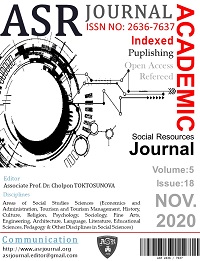ÖĞRETİM ELEMANLARININ ETİK TUTUMLARINA İLİŞKİN HEMŞİRELİK LİSANS ÖĞRENCİLERİNİN ALGILARININ BELİRLENMESİ
Author :
Abstract
Bu çalışma Aksaray Üniversitesi hemşirelik lisans öğrencilerinin, öğretim elemanlarının etik tutumlarına yönelik algılarını belirlenmek amacıyla tanımlayıcı tipte planlanmıştır. Araştırmanın evrenini 2017-2018 bahar döneminde Aksaray Üniversitesi Sağlık Bilimleri Fakültesi Hemşirelik Bölümü’ne kayıtlı tüm hemşirelik öğrencileri oluşturmuştur. Çalışmaya katılım oranı %80'dir. Verilerin toplanmasında “Öğrenci Tanıtım Formu” ve “Hemşirelik Lisans Öğrencilerinin Öğretim Elemanlarının Etik ve Etik Olmayan Tutumlarına İlişkin Algılarının Belirlenmesi Ölçeği” kullanılmıştır. Öğrencilerin sosyodemografik özelliklerinin belirlenmesinde sayı, yüzde, ortalama ve standart sapma, değişkenler arasındaki farklılıkların analizinde ise tek yönlü varyans analizleri ve bağımsız örneklemlerde t testi kullanılmıştır. Öğrencilerin yaş ortalaması 20.68±5.59, %67.0’si kadın ve %64.7’si etik ile ilgili bir ders/eğitim almıştır. Ölçek toplam puanının 48.87±6.88 olduğu, cinsiyetin etik algı düzeyini etkileyen bir faktör olduğu saptanmıştır (p=0.000). Üçüncü sınıf öğrencilerin etik algı düzeylerinin en yüksek olduğu (49.73±3.81) ve etik ders/eğitim alan öğrencilerin almayan öğrencilere göre daha yüksek puan aldığı ancak öğrencilerin sınıfı ve etik dersi/eğitimi alma durumu ile öğrencilerin etik algıları arasında bir ilişki olmadığı görülmüştür (p≥0.05). Not verirken adil davranan, başkalarının yanında öğrencilerinin onurlarını kıracak davranışlarda bulunmayan ve ders ile ilgili yeterli bilgiye sahip olan öğretim elemanlarının öğrenciler için rol model olacağı düşünülmektedir.
Keywords
Abstract
This study was planned in a descriptive type in order to determine the perceptions of Aksaray University nursing students towards the ethical attitudes of faculty members. The universe of the study was formed by all the nursing students enrolled in Aksaray University Faculty of Health Sciences Nursing Department in the spring term of 2017-2018. Participation rate in the study is 80%. “Student Introduction Form” and “Student Perceptions of Faculty Members’ Ethical and Unethical Behaviours Instrument” were used to collect data. Number, percentage, mean and standard deviation were used to determine the socio-demographic characteristics of the students, and one-way analysis of variance and independent samples t-test were used to analyze the differences between variables. The average age of the students is 20.68 ± 5.59, 67.0% of them are women and 64.7% of them have received a course / education related to ethics. It was determined that the total score of the Student Perceptions of Faculty Members’ Ethical and Unethical Behaviour Instrument was 48.87 ± 6.88, and gender was a factor affecting the level of ethical perception (p = 0.000). It was observed that the ethical perception level of the third year students was the highest (49.73 ± 3.81) and the students who took ethics course / education got higher scores than the students who did not, but there was no relationship between the students 'class and the ethical course / education status and students' perception of ethics (p≥ 0.05). It is thought that faculty members who behave fairly while giving grades, do not behave in a way that will degrade students' honor alongside others, and have sufficient knowledge about the course will be role models for students.
Keywords
- Avcı, M. (2020). “Öğretim Elemanlarının Etik Tutumlarına İlişkin Hemşirelik Lisans Öğrencilerinin
- pp:586-593 ÖZET Bu çalışma Aksaray Üniversitesi hemşirelik lisans öğrencilerinin, öğretim elemanlarının etik tutumlarına yönelik algılarını belirlenmek amacıyla tanımlayıcı tipte planlanmıştır. Araştırmanın evrenini 2017-2018 bahar döneminde Aksaray Üniversitesi Sağlık Bilimleri Fakültesi Hemşirelik Bölümü’ne kayıtlı tüm hemşirelik öğrencileri oluşturmuştur. Çalışmaya katılım oranı %80'dir. Verilerin toplanmasında “Öğrenci Tanıtım Formu” ve “Hemşirelik Lisans Öğrencilerinin Öğretim Elemanlarının Etik ve Etik Olmayan Tutumlarına İlişkin Algılarının Belirlenmesi Ölçeği” kullanılmıştır. Öğrencilerin sosyodemografik özelliklerinin belirlenmesinde sayı, yüzde, ortalama ve standart sapma, değişkenler arasındaki farklılıkların analizinde ise tek yönlü varyans analizleri ve bağımsız örneklemlerde t testi kullanılmıştır. Öğrencilerin yaş ortalaması 20.68±5.59, %67.0’si kadın ve %64.7’si etik ile ilgili bir ders/eğitim almıştır. Ölçek toplam puanının 48.87±6.88 olduğu, cinsiyetin etik algı düzeyini etkileyen bir faktör olduğu saptanmıştır (p=0.000). Üçüncü sınıf öğrencilerin etik algı düzeylerinin en yüksek olduğu (49.73±3.81) ve etik ders/eğitim alan öğrencilerin almayan öğrencilere göre daha yüksek puan aldığı ancak öğrencilerin sınıfı ve etik dersi/eğitimi alma durumu ile öğrencilerin etik algıları arasında bir ilişki olmadığı görülmüştür (p≥0.05). Not verirken adil davranan, başkalarının yanında öğrencilerinin onurlarını kıracak davranışlarda bulunmayan ve ders ile ilgili yeterli bilgiye sahip olan öğretim elemanlarının öğrenciler için rol model olacağı düşünülmektedir. Anahtar Kelimeler: Akademik etik, etik, hemşirelik eğitimi, hemşirelik etiği ABSTRACT
